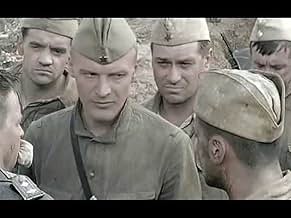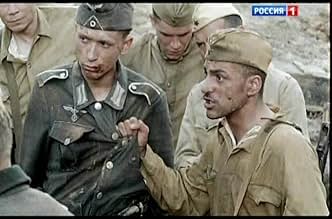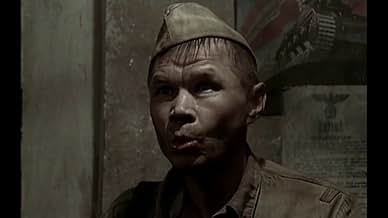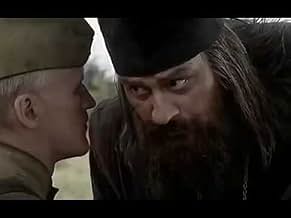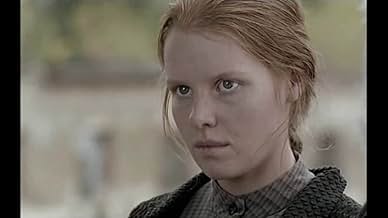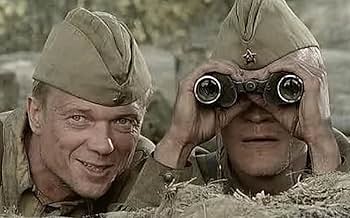Shtrafbat
- TV Series
- 2004
- 9h 10m
IMDb RATING
7.3/10
1.6K
YOUR RATING
Drama of the penalty parts of political prisoners, who fought on the Soviet fronts.Drama of the penalty parts of political prisoners, who fought on the Soviet fronts.Drama of the penalty parts of political prisoners, who fought on the Soviet fronts.
- Awards
- 2 nominations total
Browse episodes
Featured reviews
"The Penal Battalion" - the harsh military series of Nikolay Dostal. The film opens to the viewer unknown pages from the history of the Second World War. Few of us knew what terrible victims the victory of the Red Army over the Nazis was achieved, what a significant role in this victory played fines, prisoners of Soviet prisons, including the Gulag. The brilliant main role of Aleksey Serebryakov.
Many experienced and excellent actors mixed together in an ongoing plot of an untold part of world war II on the eastern front. Characters well portrayed and unforgettable. One episode leaves you wishing for the next. Pay attention to the closing credits were the thousands of Shtrafbat battalions are listed. An untold story involving hundreds of thousands of individuals. Sometimes brutal, sometimes romantic, always filled with real people and dialog. Produced with excellent sets and camera work. Heroes and villains, criminals and priests, patriots and traitors. Portrait of people struggling to survive and overcome a most terrible time. I wish to buy a copy for my own collection so to be able to enjoy the series repeatedly.
With the war not going well for the Soviet Union, Stalin accepted volunteers from the prisons and used the prisoners as shock troops. This is the story of one such battalion. There are petty crooks, political prisoners, soldiers kicked out of other units, gray-haired veterans of the White Army plus some dangerous criminals.
They are thrown into battle ill-equipped, untrained and face the threat of the NKVD if they show signs of cowardice or failure.
The special effects are rudimentary and many of the minor characters are one-dimensional, but the overall story is very human and riveting.
I have not seen a version with subtitles or dubbing. Viewing the show required liberal use of the pause button and explanations from a native speaker of Russian.
They are thrown into battle ill-equipped, untrained and face the threat of the NKVD if they show signs of cowardice or failure.
The special effects are rudimentary and many of the minor characters are one-dimensional, but the overall story is very human and riveting.
I have not seen a version with subtitles or dubbing. Viewing the show required liberal use of the pause button and explanations from a native speaker of Russian.
Shtrafbat is the story of a Soviet penal battalion at the height of the Second World War. The film follows the characters from the formation of the battalion in the prison yard to its complete decimation in combat against the Germans.
The film is a good introduction to the complexities of the Soviet war effort, covering the various motivations the characters have for signing up and the callous attitude of the military towards these people as well as giving a good idea of what an absolute hell the Eastern Front was.
The premise and the acting are generally good, but the story seems to move along in fits due to a mediocre directorial effort on the part of Dostal'. Perhaps he was unfamiliar with the mini-series format or just short on time, I don't know, but on the whole the film seems rather artificial and constructed. Segue contrast with "Seventeen Moments of Spring" and "Shield and Sword". Oh Well.
Shtrafbat could have been a whole lot better. Certainly. It is nonetheless worth watching for the history and (if for nothing else) the excellent final scene.
The film is a good introduction to the complexities of the Soviet war effort, covering the various motivations the characters have for signing up and the callous attitude of the military towards these people as well as giving a good idea of what an absolute hell the Eastern Front was.
The premise and the acting are generally good, but the story seems to move along in fits due to a mediocre directorial effort on the part of Dostal'. Perhaps he was unfamiliar with the mini-series format or just short on time, I don't know, but on the whole the film seems rather artificial and constructed. Segue contrast with "Seventeen Moments of Spring" and "Shield and Sword". Oh Well.
Shtrafbat could have been a whole lot better. Certainly. It is nonetheless worth watching for the history and (if for nothing else) the excellent final scene.
"Shtrafbat" (2004), an 11-part TV series, is about Soviet Army battalions made up of many kinds of prisoners, hoping to be "rehabilitated" of their "crimes".
"Shtrafbat" (Punishment or Penal Battalions) were made up of deserters, political prisoners, and former POWs who had returned from German captivity (according to Stalin: allowing ones-self to be captured alive & imprisoned was akin to surrendering, & surrendering was considered to be treason, a crime punishable by death), and even "regular" criminals sent from prison-camps, so the suspicion that these people wouldn't fight well, or might even surrender, was high. These "criminals" were "graciously" allowed "a second chance" by the government, a chance to "wash away their past sins with their own blood."
These "Shtrafbat" were sent on the most dangerous and difficult missions (i.e. those with low survivability) and were followed into battle by troops who were called "Zagrad-Otryad" (Blocking Troops), and were under NKVD (precursor to the KGB) control. Sometimes these troops were almost as large as the actually fighting units they blocked. They were under orders to shoot any Soviet soldiers who were thought to be retreating, be they wounded or not.
The few "Shtrafbat" soldiers who lived through it for some months, were considered rehabilitated and returned to regular army units. The KIAs were rehabilitated posthumously, sparing their families from being branded as families of traitors, "enemies of the Soviet people."
"Shtrafbat" (Punishment or Penal Battalions) were made up of deserters, political prisoners, and former POWs who had returned from German captivity (according to Stalin: allowing ones-self to be captured alive & imprisoned was akin to surrendering, & surrendering was considered to be treason, a crime punishable by death), and even "regular" criminals sent from prison-camps, so the suspicion that these people wouldn't fight well, or might even surrender, was high. These "criminals" were "graciously" allowed "a second chance" by the government, a chance to "wash away their past sins with their own blood."
These "Shtrafbat" were sent on the most dangerous and difficult missions (i.e. those with low survivability) and were followed into battle by troops who were called "Zagrad-Otryad" (Blocking Troops), and were under NKVD (precursor to the KGB) control. Sometimes these troops were almost as large as the actually fighting units they blocked. They were under orders to shoot any Soviet soldiers who were thought to be retreating, be they wounded or not.
The few "Shtrafbat" soldiers who lived through it for some months, were considered rehabilitated and returned to regular army units. The KIAs were rehabilitated posthumously, sparing their families from being branded as families of traitors, "enemies of the Soviet people."
Did you know
- ConnectionsReferenced in Comedy Club: Episode #1.13 (2005)
Details
- Release date
- Country of origin
- Language
- Also known as
- The Penal Battalion
- Production companies
- See more company credits at IMDbPro
- Runtime9 hours 10 minutes
- Color
Contribute to this page
Suggest an edit or add missing content


